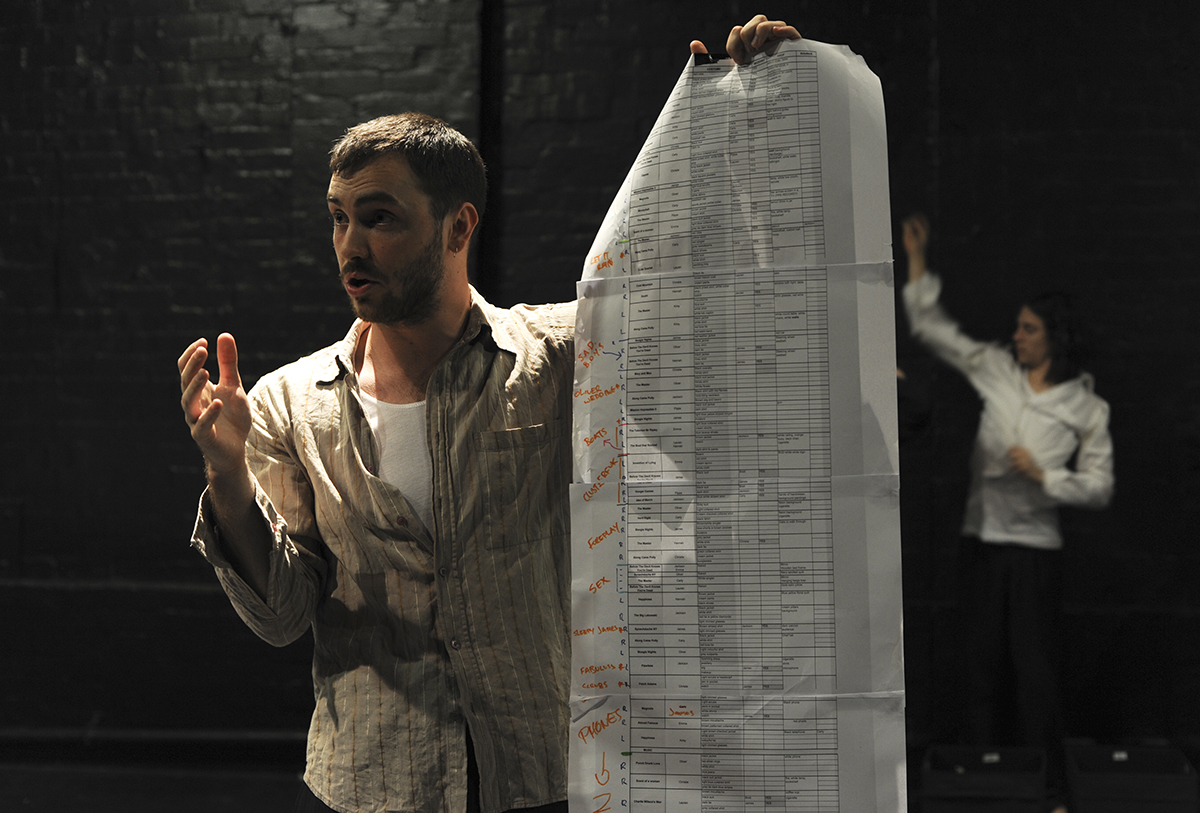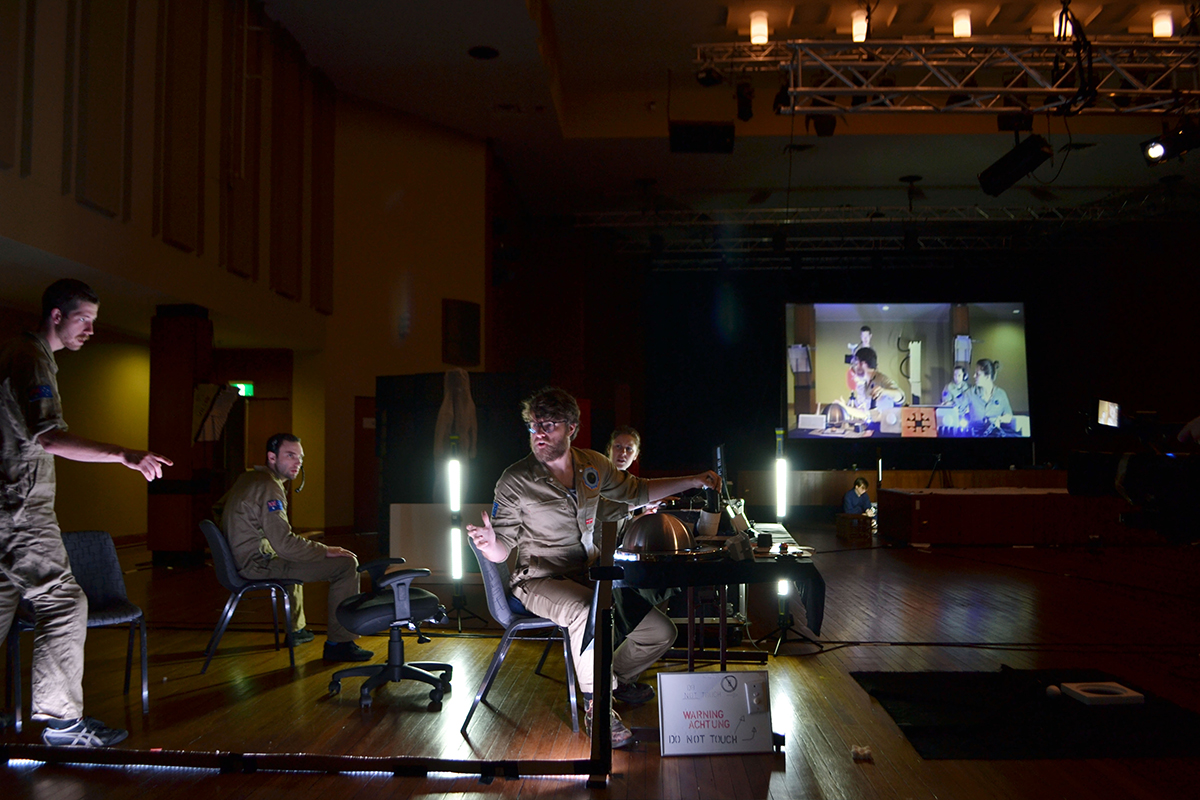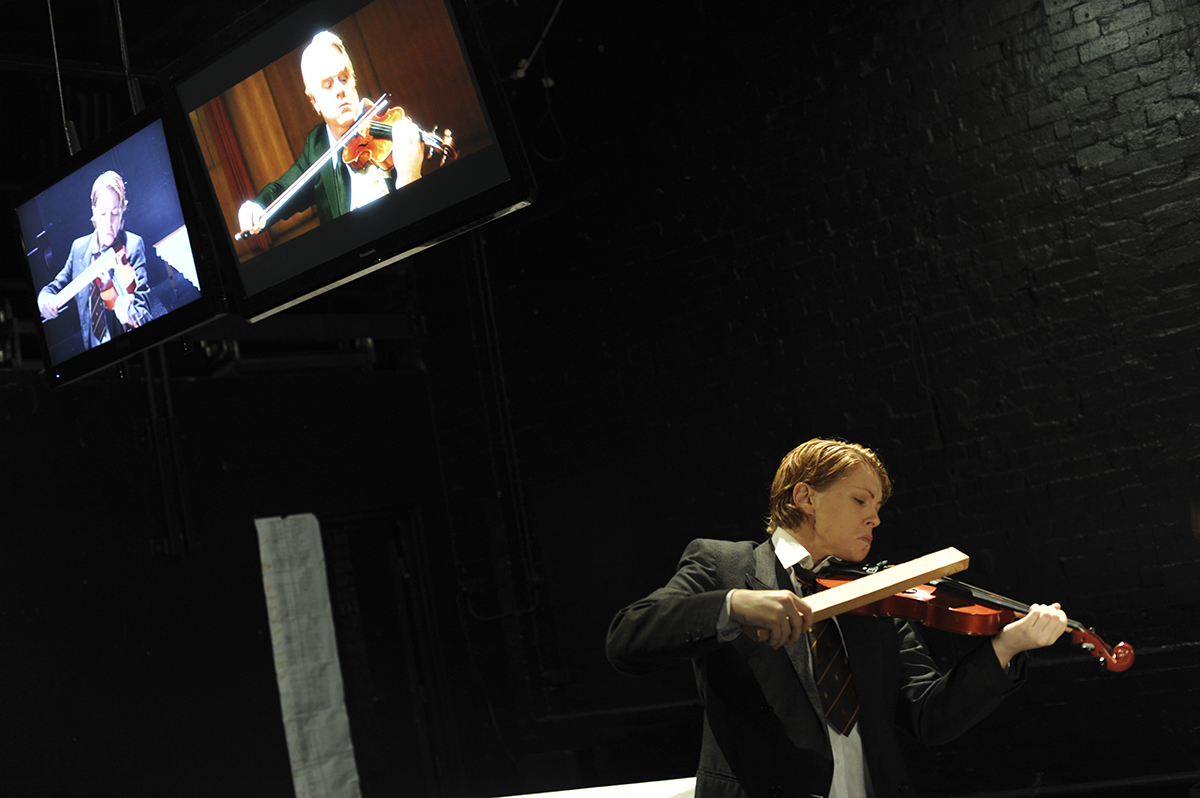
Jackson Davis: The art of videographic performance
My interview with Jackson Davis, a member of the re:group performance collective, took place via email in two stages. I’d heard early in 2017 that re:group were to stage a sci-fi work, Route Dash Niner: Part II, in September, a fascinating prospect for a genre fan like myself. In August Davis replied to my request for an interview from Japan where he was performing in Erth’s Dinosaur Zoo. Subsequently I was in Adelaide for the OzAsia Festival and missed Route Dash Niner, but in my stead Nikki Heywood provided an evocative account for RealTime, describing the group’s dextrous deployment of props and cameras:
“Dizzying sequences and scene cuts abound as live camera feed is projected onto multiple projection screens. Instead of CGI animation re:group makes hilarious and inventive use of toy spaceships moved by hand across black cloth to simulate space cam footage, creating the impression of an extensive craft by filming in corridors, broom closets and barely concealed behind pillars.”
Heywood concludes her review, asking, “when will we see Route Dash Niner: Parts I & II staged as an epic double, on tour or programmed into a major arts festival?”
When Davis next communicated he was again with Erth, this time in Abu Dhabi. I was keen to know about re:group’s influences and aspirations. The collective, comprising Davis and fellow core collaborator Carly Young along with Stephen Wilson-Alexander and Solomon Thomas, all University of Wollongong graduates in performance, had gripped me with their 2014 work Lovely, a hugely inventive tribute to the late Philip Seymour Hoffman. In an attempt to conjure the actor’s spirit, the performers recreate scenes from films he appeared in and which are clustered according to characteristic tropes — Hoffman on the phone, Hoffman smoking, etc. Individual performers variously become the actor against manually wielded cardboard cut-out backdrops while the rest work as film crew operating cameras and microphones in a deft dance of furious studio production. We simultaneously see the original film scenes on monitors suspended across the performance space. My immediate response was that Lovely, with its telling portrait of an actor’s idiosyncracies and an evocation of his charisma, along with its deft use of humble means, warranted a larger audience. Although formally influenced by the work of UK live artist Richard DeDominici’s The Redux Project, Lovely stood out as a highly original work.
I was also intrigued that Davis and re:group are part of a steady stream of UOW graduates in performance from over the last decade who have continued to mount distinctive productions, individually and collaboratively, including Team MESS, Appelspiel, Nat Randall, Malcolm Whittaker and Mark Rogers. One-time Team MESS collaborator Georgie Meagher is Artistic Director of Melbourne’s Next Wave and, in April this year at Belvoir, Shopfront Arts Co-op presented, in a double bill, The Carousel, a sharply observed account of the travails of teenage sisters written by Pippa Ellams, directed by Hannah Goodwin and performed by Alex Francis and Tasha O’Brien, all recent UOW graduates. Jackson Davis attended UOW from 2008 to 2012.

Route Dash Niner, re:group, photo courtesy the artists
How would you describe your own and re:group’s approach to making work?
Our projects are experimental, exploring pop culture and videography through hybrid art forms. Personally I like the internet, video games and electronic music. At best my work should be fun, new, harsh and should cast its net as broadly as possible. I want to spend as much time not doing art as I spend doing it. For the benefit of both.
Who are your most significant influences?
At university I loved Societas Raffaello Sanzio, The Wooster Group and the writing of the Slovenian Marxist philosopher Slavoj Zizek. Now I like pretty much anything from digital content juggernaut Adult Swim. The more time I spend online, the more I appreciate its fever dream-like body of work. Richard DeDominici’s The Redux Project has been a big influence on my approach to pop culture and videography — he’ll go to the locations of iconic Hollywood blockbusters and re-shoot sequences starring himself and his friends. Lovely borrowed heavily from Richard DeDominici’s style, as well as my lifelong crush on the now dead Philip Seymour Hoffman. I also think a lot about Christian Marclay’s The Clock, how it uses that one cinematic trope to engineer a functioning machine.
Tell me about the successive stagings of Route Dash Niner.
The idea was to do a sci-fi work in two parts, separated by a year. The first, performed October 2016, was staged as a press conference announcing the discovery of a mysterious signal coming to us from a distant pocket of the universe. We declared our intention to investigate it, saying goodbye to four brave friends who had volunteered to commandeer the mission. Family members were invited to say their goodbyes and give parting gifts. Now, one year later, we are on-board the ship just weeks from the crew’s destination.
Part Two is a celebration of the making of an ambitious home video and DIY-interstellar wonder — the shooting of a sci-fi film in real time before a live audience. We wanted to build on the trashy cinematic aesthetic we had developed in Lovely, with its bustling performers jumping between actor, cinematographer and prop. And sci-fi felt like a good genre, bouncing around in your seat to simulate meteors hitting the solar array; that kind of thing.
What did your years at UOW give you?
I got a lot out of student-initiated projects during my time there. These allowed my peers and me to put into practice the performance-making skills we had been learning in class. Surrounding myself with a crew of passionate artists of equal inexperience was a really exciting and enriching opportunity. We got to play performer, director, writer, designer and dramaturg, mostly in response to whatever problem a project faced. Being given the freedom to work in this way, under brief and enabling mentorship, gave me a strong sense of experimentation, allowing me to test what worked and what did not, helping my peers and me develop our taste and style. Without these opportunities my first attempts at performance-making would have occurred post-degree, with my resources greatly diminished and my self-discipline a few grits rougher than it should be.

Lovely, re:group, photo Heidrun Löhr
What are you currently working on?
I’m at the end of a tour performing with Erth. It’s a puppeteering first for me, and a really rewarding environment to develop that craft. And kids give very clear feedback. I’m now collaborating on a new piece called UFO Play (working title) that uses tabletop miniatures to stage an alien landing.
Does Lovely, which I’m keen to see again, have a future? And what kind of future do you see for re:group?
We would really love to bring Lovely to a broader audience; I think people would really enjoy it. The dream for now is to give the work the time and production it deserves, getting it up somewhere in Sydney then touring it nationally. A remount is inevitable. I’m confident the work is solid, it just needs an equally solid pitch. Long-term for re:group is to keep making performance works that innovate with videography.
–
For more about re:group, visit the performance collective’s website.
Top image credit: Jackson Davis, Lovely, re:group, photo Heidrun Löhr






